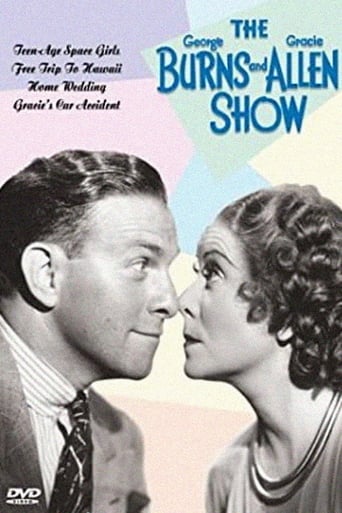

Gee whiz I don't think I've ever loved a show quite this much. I thought I'd found the best when I watched the Dick van Dyke show, but I have to say, George and Gracie top it. The wittiness is out of this world and Gracie delivers it with the utmost perfection. I, a person who does not laugh out loud quite often when watching anything, can't keep my mouth shut when watching. Time after time I find myself spending time I that I don't have on the show. It's highly addictive!
... View MoreIf you really enjoy watching vintage TV Sit-Coms that go all the way back to that medium's "golden years" - Then - "The George Burns & Gracie Allen Show" should be a truly delightful treat for you. Presented by "Carnation Condensed Milk" (from "contented" cows) - This old-time TV program certainly contains some genuinely priceless moments of absolutely uproarious comedy.With the cigar-puffing, George Burns playing the straight man against Gracie Allen's hilarious clueless-flake shtick - The excellent rapport that took place between these two seasoned actors has got to be seen to be believed. Filmed in b&w - This 5-disc set contains 8, half-hour episodes, spanning from the years between 1950-1958. As an added bonus - There's a 50-minute "Hollywood Couples" documentary included, too.*Note* Gracie Allen lived to be 70 years old. George Burns lived to be 100.
... View MoreIn this American sitcom, George Burns and Gracie Allen bring their "Burns and Allen" radio program to television. George Burns, Gracie Allen, and their son (Ronnie Burns) essentially play themselves. The Burns family and their friends constantly find themselves involved in situations which are usually the result of Gracie's state of perpetual confusion.Many modern audiences have difficulty watching old television sitcoms from the 1950's. The acting seems a bit strange; and, the situations seem a bit exaggerated. One of the reasons why the old sitcoms seem so different from modern ones is that the shows from the fifties were essentially radio programs which were performed in front of television cameras. Audiences might notice that the actors' diction in the old sitcoms is different. Anyone who closes his or her eyes and listens to the audio from a 1950's sitcom will notice that the audio often sounds exactly like a radio show. Furthermore, many of the scenes on Burns' and Allen's show were essentially stand up comedy routines.Members of modern audiences might be somewhat disappointed by George Burns' character in this sitcom. Many probably know George Burns better from his solo period following Gracie Allen's death. While performing alone, Burns proved himself to be a very funny comedian. During his earlier Burns and Allen period, George Burns usually served as the straight man to the ditzy character played by Gracie Allen. While Burns did demonstrate some of his dry wit during the Burns and Allen era, he also seemed a bit more subdued while reacting to the peculiar things which were said by Allen's character. People need to remember that this was a different period in George Burns' career; and, anyone who gives this show a chance will learn to appreciate Burns' role as a member of a comedy duo.Some audience members might have difficulty coping with Gracie Allen's character. Many might be irritated by the character's unrelentingly ditzy personality as well as constant state of confusion. For those people, her character might seem excessively silly or exasperating; and, they might wonder why the Burns character would tolerate being married to somebody who was so infuriating. Modern audiences must remember that the characters were developed for the Burns and Allen stand up routine, and were never intended to be subtle or well rounded."The George Burns and Gracie Allen Show" provides modern audiences with a fascinating look at television and comedy from an earlier era. Some viewers might find it difficult to get used to some aspects of the show. However, anyone who gives the show a chance will be rewarded; because, it has a way of growing on a person over time.
... View MoreI love to watch the Burns and Allen show as it is one to the unique shows that we had. Gracie and George were the perfect couple. You had to laugh as she took things so to there meaning and it worked perfect. I sometimes watch the 70's show and in a way Red and Kitty almost seem to be them in another era but still not exactly the same. I just find that their looks like Kitty's hair and Red even has a similar look like George. Back to George and Gracie now. I would love to have all their shows, especially the ones with that TV that could George could see what was going on in the show. That is something that really was to cool. I hope to see them release all their shows as I have only a few and wish that all were on DVD. One more thing I feel that if the show was aired more often and some people would show it to their children, it could bring a new light. I know this as when I show it on DVD to my kids they are older like 17 and up really start to get into it after a few shows. Hurry for Burns and Allen, and also their neighbors too.
... View More